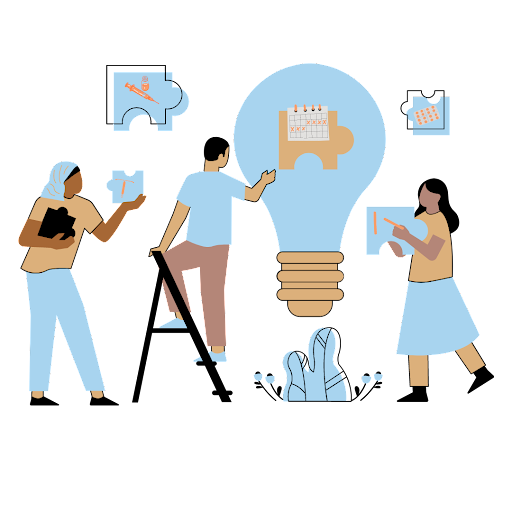WHAT ISN’T WORKING?
The third Learning Circles session is centered around a knowledge management technique called “Troika Consulting.” In small groups, participants take turns sharing a challenge they personally face in their advocacy work to increase funding for family planning at the national level, and seek advice from their fellow group members.
Below are examples of challenges identified by participants and proposed solutions:
- Once we’ve received commitments from decision-makers through advocacy efforts, it’s often difficult to follow up and ensure that these commitments are implemented.
- Solutions:
- At the time of advocacy or commitment-seeking, agree on the operationalization plan, process, and deadlines.
- Put in place a team or assign individuals to be responsible for ongoing monitoring.
- There are laws that require budget lines for each institution to support youth organizations, but in reality, this is not enforced.
- Solutions:
- Document the law and all provisions requiring institutions to set aside a budget line.
- Approach decision-makers with legal instruments and texts.
- The non-existence of a budget line for family planning in the Ministry of Health
- Solutions:
- Formulate a clear message explaining the advantages of making contraceptive methods free of charge to adolescents and young people.
- Establish solid and convincing arguments.
- Establish strong alliances.
- Lack of motivation among young people and youth organizations to mobilize domestic resources.
- Solutions:
- Train young people and raise their awareness of the importance of domestic resources.
LESSONS LEARNED
In the fourth and final session, participants discussed how to apply lessons learned from the successful implementation of domestic resource mobilization initiatives to the challenges likely to be encountered in future situations. During the session, participants were asked to imagine the following scenario:
In 2026, 4 years from the deadline for achieving FP2030 commitments, government donations account for around 80% of total funding for family planning in francophone African countries. Each country has a budget line for family planning that is 100% consumed, covering the purchase of 100% of contraceptive needs and 90% of the cost of demand creation and service delivery campaigns.
In small groups, participants brainstormed around the factors that would have led to this explosive success, what people would have said, and who would have contributed. Each group then shared their ideas in plenary. A summary of the priority success factors based on the lessons learned that emerged from the groups is listed below:
- Key factor #1: Significant commitment from all players, especially the government.
- Key factor #2: Private sector as main source of family planning funding.
- Key factor #3: Innovative strategies (advocacy), monitoring plans, and documentation of best practices.
- Key factor #4: Collaboration between and accountability of youth associations.
- Key factor #5: Family planning as a government priority and good management of allocated resources.
ACTION PLANNING: COMMITMENT STATEMENTS
To conclude the virtual series, all participants developed a commitment statement concerning a specific action they planned to take to help solve a specific problem they are facing, related to advocating for increased funding for family planning at the national level, or to scale up what is already working well. Below are examples of participants’ commitments:
- I commit to update the complete list of youth organizations involved in reproductive health and family planning in my country.
- I commit to mobilize 5 youth associations.
- I commit to identify 5 companies with a Corporate Social Responsibility policy.
- I commit to provide the contraceptive prevalence rate for adolescents and young people in my country.
- I commit to identify 5 organizations that are experts in the provision of FP/RH services in my country.
- I commit to identify 2 private structures from which resources can be mobilized in my country.
- I commit to identify youth organizations involved in FP/RH in the Atlantic and coastal regions of my country.
- I commit to (1) take stock of youth organizations involved in FP/RH in the Littoral Department and share it with the Monitoring committee for sexual and reproductive health for adolescents and youth and gender-based violence interventions in the Littoral region and (2) share the knowledge I have acquired during this Learning Circles cohort with participants in a forum for young activists in my country.
- I commit to report on the contraceptive prevalence of adolescents and young people in Littoral/my country over the past quarter.
- I commit to make a plea to the municipal authorities of my region to have a budget line for family planning in the next budget.
- I commit to identify private companies from which I can mobilize domestic resources.
- I commit to draw up a follow-up plan for each plea to mobilize domestic resources from private companies.
- I commit to train 10 leaders of youth organizations in domestic resource mobilization techniques, and to plan a working session with the Ministry of Health and UNFPA to advocate so that they can provide a budget line for youth activities in the area of ASRH.
- I commit to raising awareness about resource mobilization, and to advocate with leaders in my area.
CONCLUSION











